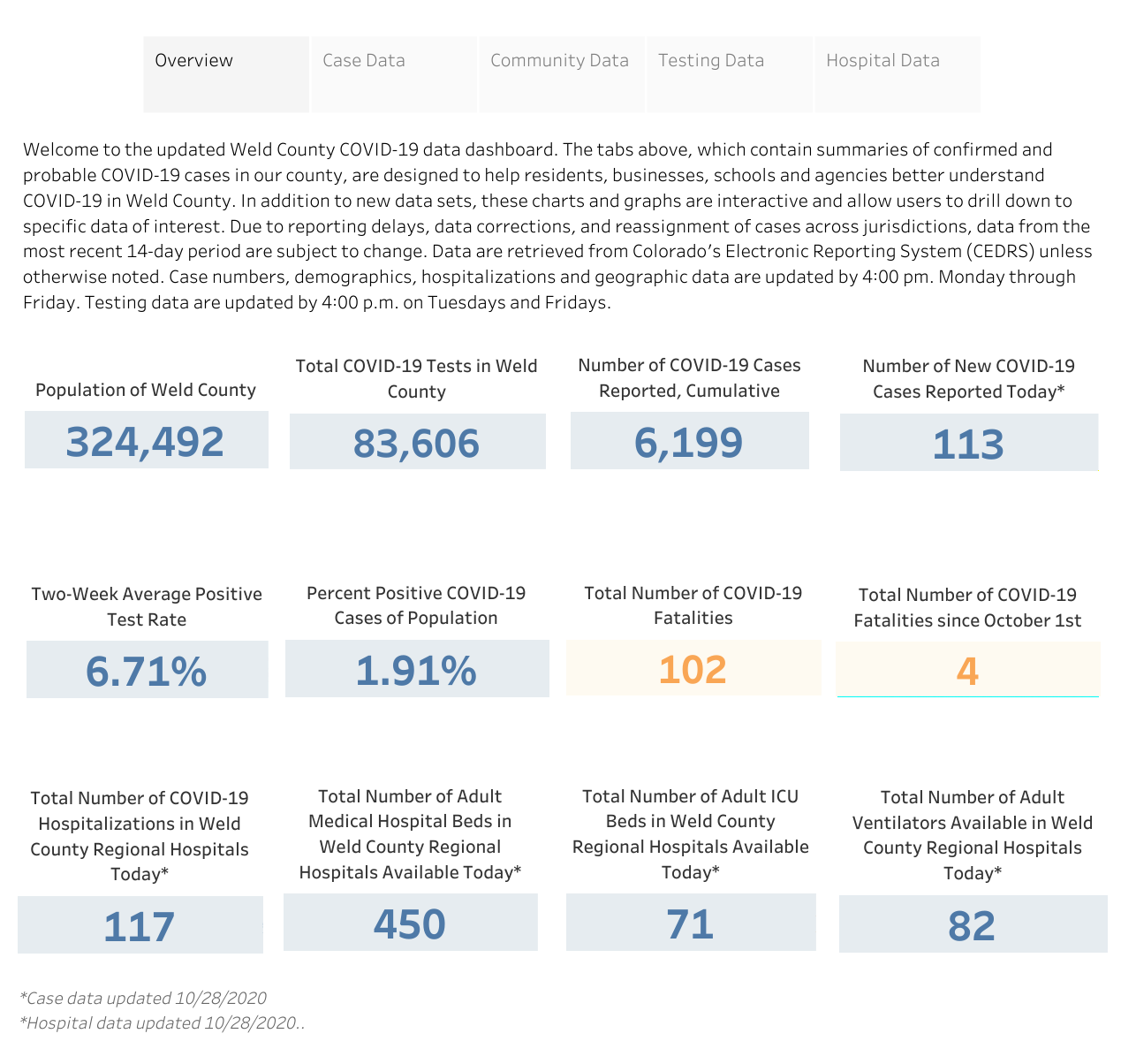As coronavirus cases tick up, Weld County’s top officials still voice doubts about wearing masks, despite overwhelming support from the scientific and medical community
By Kelly Ragan
As of Wednesday, Weld County’s two-week average for positive COVID-19 tests was 6.71%. The goal, according to the county, is to stay below 5 percent. And yet Weld’s top officials still voice doubts about wearing masks.
Four people have died this month because of the virus, bringing COVID-19 deaths up to 102, according to county data. The state logs 159 COVID-19 deaths in Weld, according to its website.
Since March, Weld County Commissioners have favored personal accountability to enforcing restrictions.
“The county continues to provide information and resources to municipalities and first responder agencies through the health department, the Office of Emergency management, and our COVID-19 data dashboard,” said Jennifer Finch, spokesperson for the county. “Case investigations show no common element to the rise other than what everyone else is facing – school back in session and people are indoors more than they were over the summer.”
Coronavirus case data overview, provided by Weld County.
Finch said the county has and will continue to stress prevention, which includes staying home when you’re sick, covering your cough, keeping six feet apart, and washing your hands and frequently touched surfaces.
The county continues to say “cover your cough” in official communications rather than “wear a mask.” In fact, officials also still said wearing a mask may not do any good, despite reports that say otherwise from experts such as the Centers for Disease Control and the Mayo Clinic.
“The word ‘mask’ strangely has become a political trigger for people and takes the discussion away from the health issue and throws it into the realm of politics,” Finch said.
“But here’s where the board is with officially recommending the use of masks: there is no real consensus either way on whether or not masks actually work.”
We know staying home when you aren’t feeling well keeps you from spreading an illness to others. We know handwashing helps kills viruses and germs and thereby reduces their spread. We know that not being so close to other people reduces the likelihood that you will catch an illness from them. What we don’t know, is whether or not the wearing of masks actually prevents the spread of COVID-19, nor do we know whether or not the wearing of masks causes more harm than good.”
Finch said there are studies on both sides of the issue. If people believe masks work, she said, people are already wearing them. If they don’t believe they work, she said, they probably aren’t wearing them and won’t be convinced by the government telling them to do so.
But scientists and respectable medical institutions widely agree cloth masks help slow the spread and encourage people to wear them.
“A cloth mask is intended to trap droplets that are released when the wearer talks, coughs or sneezes. Asking everyone to wear cloth masks can help reduce the spread of the virus by people who have COVID-19 but don't realize it.
Cloth face coverings are most likely to reduce the spread of the COVID-19 virus when they are widely used by people in public settings. And countries that required face masks, testing, isolation and social distancing early in the pandemic have successfully slowed the spread of the virus.” - Mayo Clinic
“If you are in a public place where you will encounter other people, you should wear a mask. Face masks help contain respiratory droplets that can transmit SARS-CoV-2, the coronavirus that causes COVID-19, from people who do not know they have the virus.” -Johns Hopkins
“Masks should be used as part of a comprehensive strategy of measures to suppress transmission and save lives; the use of a mask alone is not sufficient to provide an adequate level of protection against COVID-19.” - World Health Organization
“Masks provide an extra layer to help prevent the respiratory droplets from traveling in the air and onto other people,” - CDC.
Why does it matter?
While case numbers are an important metric, state health officials are also concerned about hospitalizations.
According to a report by the Colorado Sun, state hospitalizations are at their highest level since May 21.
Colorado’s top epidemiologist, Dr. Rachel Herlihy, warned that if the trend wasn’t reversed, the state’s intensive-care hospital bed capacity could be surpassed in the coming months, according to the Sun.
Governor Jared Polis announced new restrictions Oct. 23 in an effort to slow the spread.
One of the biggest changes is a new limit to personal gatherings. The new guideline limits personal gatherings to no more than 10 people from no more than two households.
Hospitalizations in Weld aren’t ringing any alarm bells yet -- but that could change if the case numbers continue to climb.
As of Wednesday, the 7-day rolling average percent of hospital beds occupided by COVID-19 patients in regional Weld hospitals was 9.7%. On Oct. 1, the rolling average was 4.4%.
For context, the highest the rolling average percent has been was 19.3% on April 14.
But despite a lower percent of COVID-19 patients using hospital beds, there are fewer beds available now.
Remember, elective surgeries are up and running again. Many folks are back to their regular driving habits.
As of Wednesday, there were 71 ICU beds and 450 medical/surgical beds available in Weld County regional hospitals.
On Oct. 1, there were 121 ICU beds and 485 medical/surgical beds available.
On April 14, when the 7-day rolling average percent of hospital beds occupided by COVID-19 patients in regional Weld hospitals was at its peak, the region had 141 ICU beds and 583 medical/surgical beds available.
“We cannot go on as we have been,”Polis said during a news conference Oct. 20. “The status quo is not acceptable. We need to do a better job of wearing masks around others, staying apart from others, reducing our social interactions.”


